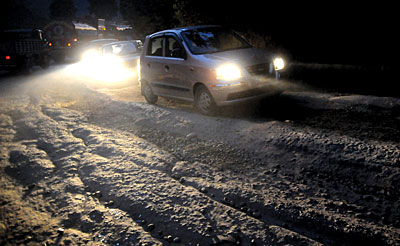 DIPESH SHRESTHA |
Lila Mani Poudel, Secretary to the Prime Minister's Office, has had a torrid Dasain. It all began last year when, travelling home to Gulmi, he noted with shock the state of the Prithvi Highway leading out of the Kathmandu Valley. Overloaded tipper trucks carrying wet sand and rocks excavated from river beds had sunk deep ruts into the highway. Upon his return to work, Poudel instructed the transport management departrment to prohibit overloading. The reports that landed on his desk suggested progress was being made.
To his horror, Poudel discovered the road was in far worse shape when he travelled home this Dasain. "They tricked me," he lamented in a front-page editorial in Nagarik last week alongside a photo of a section of the ruined highway between Naubise and Nagdhunga. Those in the excavation business have always claimed they were providing employment and paying hefty taxes. Indeed, they may have lined the pockets of the relevant authorities with millions. It has been estimated repairs will cost upwards of a billion and a half rupees.
Poudel's travel travails were far from over. He observed that at several points along the highway, either police or apparently unauthorised men were collecting fees from public transport vehicles, including the microbus he was travelling in. This was taking place under various pretexts, with or without receipts. Poudel called the police chief of Chitwan to complain, en route. The incident led to the suspension of four police personnel. They subsequently accused Poudel of using his position to interfere with a legitimate fine they were imposing on the driver.
Lila Mani Poudel's run-ins with two separate rackets illustrate the extent to which corruption has permeated Nepali society and the state. The long-suffering Nepali public, of course, is well-habituated to both direct corruption (through extortion of 'taxes' by public officials) and indirect corruption (whereby abuse of public resources such as highways is swept under the tarmac, so to speak). The average Nepali is also largely helpless in the face of such criminality.
But what does it say to us when a high-ranking official at the Prime Minister's Office is as helpless in the face of corruption? It may surprise us in the first instance that someone might attempt to command back the tide of corruption in Nepal; get beyond that, and we begin to understand that even a well-meaning, well-placed individual is largely ineffective in the face of a whole network of corrupt individuals.
Sadly, this week's headlines have already confirmed the truth of this. According to Transparency International's Corruption Perception Index, Nepal is now ranked 146 among 180 countries. Perhaps we should take solace in the fact that people like Poudel still exist, and are expressing their opinions loud and clear. If a whole network of Nepalis began to say 'No!' to corruption, the tide might actually begin to retreat.
READ ALSO:
Corruption at the core
Traffic in a jam
Cocking a snook, DAMAKANT JAYSHI
We know what works, BIHARI K SHRESTHA
Festive fervour, RABI THAPA
Looking east, ARTHA BEED


